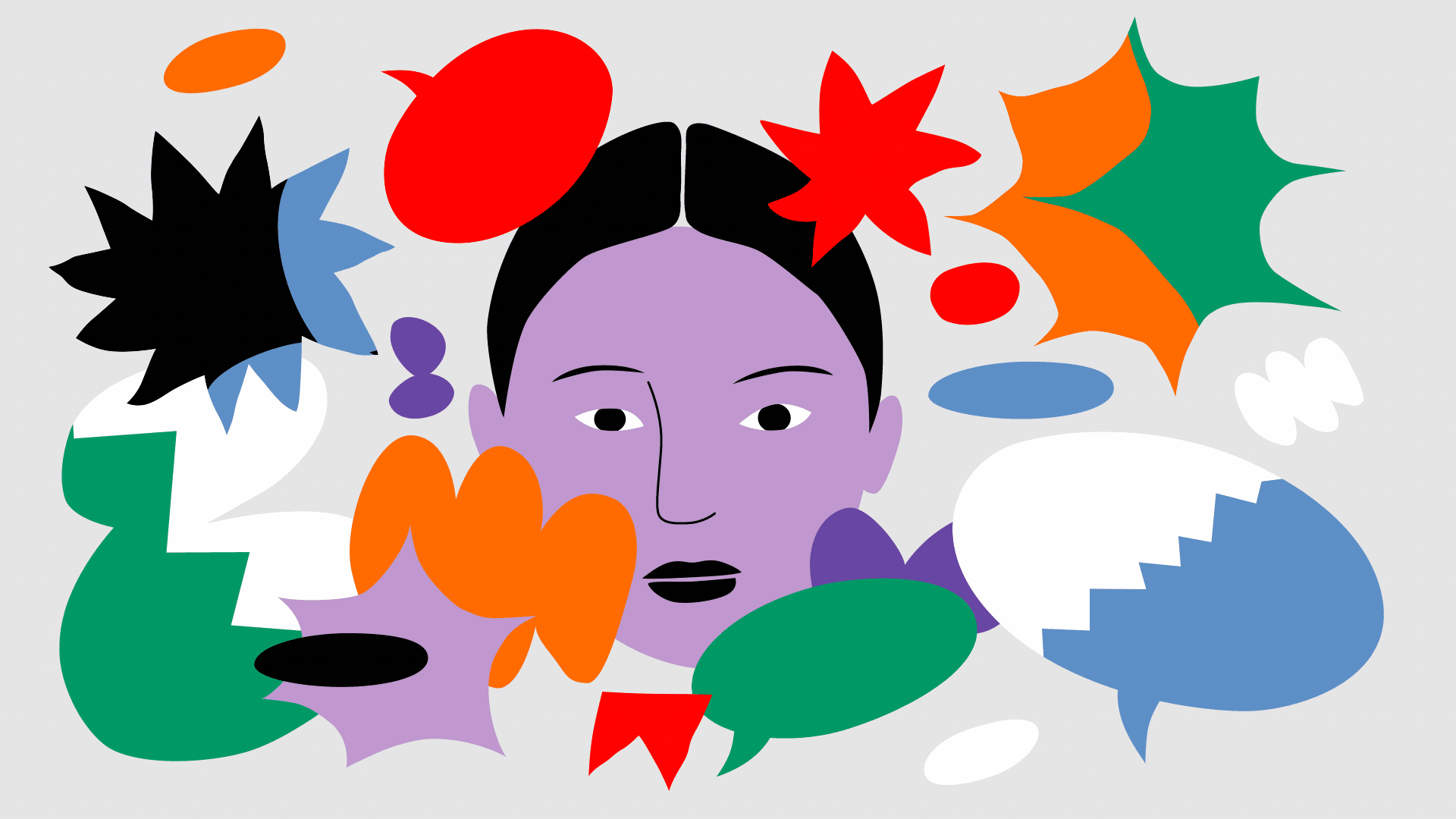VOLUME 1 / ARTICLE 2︎

Written by Julie Se
Illustrations by Thaila Khampo
June 2020

ONE IN A BILLION
A Reflection On How to Find Yourself Outside Of The Norms Of Performance Culture
Written by Julie Se
Illustrations by Thaila Khampo
June 2020

One night a close friend of mine, who is a first generation immigrant from Argentina, brought up the headline of an article that she stumbled upon on Facebook detailing an incident in which a hospital patient, who was a white woman, refused care from a doctor because they were of Asian descent. She found it difficult to wrap her head around why this woman would refuse care from someone who would presumably meet the expectations of the stereotypical Asian. In her view, people of Asian descent usually benefited from an advantageous image composed of many positive attributes, such as having higher intelligence, working hard, being well-mannered and so on. As I heard this, I couldn’t help but immediately compare myself to her description: a ‘better’ version of me—a version that checked all of the boxes I didn’t.
I’ve come to realize that this seemingly positive, perhaps even intentionally flattering stereotype, has affected the way I view myself. Unpacking the feelings associated with the pressure that I felt to live up to this model minority image brought me to think about the millions of people who grew up feeling like they were constantly falling short, or that they were not good enough. Trust me, a short and fleeting “it’s because you’re Asian” comment can be a glaring reminder of the expectations that were unwillingly imposed on you since the day you were born.
As a second-generation Korean-Canadian who does not speak Korean fluently, I was always aware of the Korean community, but never felt that I belonged. One Sunday morning my friend dragged me to a Korean church service for which his dad was the pastor. As someone who rarely interacted with the Korean community in town, I was shocked when strangers approached me asking how my family was doing. Somehow, they all seemed to know about the inner workings of each of my family members’ lives. I would spontaneously be asked about how my older sister was doing at McGill University, the school that she had just started attending.
It was there that I realized the constant dialogue concerning the “kids of the Korean community”. The accomplishments and accolades of each parent’s offspring were incessantly springing off the end of the tongue of a mother, a father, a grandparent, or an acquaintance, waiting to collide with a competing achievement to head off in the whose-kid-is-more-successful duel. Being aware of these constant comparisons created a child with an unrelenting need to live up to the standards set by others. I realized that the image of the high-achieving financially prosperous Asian was imposed on me from both within my ethnic community as well as from outside of it. Both dynamics had their own damaging effects on the image of who I thought I was ‘supposed’ to be
I’ve come to realize that this seemingly positive, perhaps even intentionally flattering stereotype, has affected the way I view myself. Unpacking the feelings associated with the pressure that I felt to live up to this model minority image brought me to think about the millions of people who grew up feeling like they were constantly falling short, or that they were not good enough. Trust me, a short and fleeting “it’s because you’re Asian” comment can be a glaring reminder of the expectations that were unwillingly imposed on you since the day you were born.
As a second-generation Korean-Canadian who does not speak Korean fluently, I was always aware of the Korean community, but never felt that I belonged. One Sunday morning my friend dragged me to a Korean church service for which his dad was the pastor. As someone who rarely interacted with the Korean community in town, I was shocked when strangers approached me asking how my family was doing. Somehow, they all seemed to know about the inner workings of each of my family members’ lives. I would spontaneously be asked about how my older sister was doing at McGill University, the school that she had just started attending.
It was there that I realized the constant dialogue concerning the “kids of the Korean community”. The accomplishments and accolades of each parent’s offspring were incessantly springing off the end of the tongue of a mother, a father, a grandparent, or an acquaintance, waiting to collide with a competing achievement to head off in the whose-kid-is-more-successful duel. Being aware of these constant comparisons created a child with an unrelenting need to live up to the standards set by others. I realized that the image of the high-achieving financially prosperous Asian was imposed on me from both within my ethnic community as well as from outside of it. Both dynamics had their own damaging effects on the image of who I thought I was ‘supposed’ to be
“Experiences like these made me realize that there was really only one extremely flat Asian Immigrant narrative written for me, and whether I fit it or didn’t, the real me didn’t matter.”

Interestingly, I found that once I achieved “model minority goals”, such as getting good grades, my efforts were often ignored. A memory from high school stands out as an example. At the end of each academic term, the honour roll list was posted just outside the principal's office. Many kids would crowd around the bulletin board to see exactly where they ranked amongst their peers. Closer to the top of the list, you would notice a shift in the last names, from the Gibbs and Millers to the Parks and Kims. When other students would scan the sheet to see their ranking, they would skip over the latter cluster of names. My own name usually sat near the top closer to the other “Asians”. On one hand, this gave me a strange sense of belonging. Even though I had very few Asian friends, did not speak the language, and was not part of any Korean events, I felt close to them, as we were all living up to this successful Asian archetype. On the other hand, I felt as if my accomplishments were overlooked because I, like my Asian peers, were already expected to perform highly by others.
Alternatively, if there was a subject that I didn’t perform well in, a white classmate would use that fact as a reason to question my ethnicity. The usual ‘it’s because you’re Asian’ became ‘I thought you were supposed to be Asian.’ Experiences like these made me realize that there was really only one extremely flat Asian immigrant narrative written for me, and whether I fit it or didn’t, the real me didn’t matter.
The detrimental effects of this identity bleaching can be seen in the 2018 lawsuit against Harvard University’s racially biased Admissions process. The data proved that there was indeed a statistically significant negative relationship between Asian-Americans and the personality rating scores that they were given, decreasing their chances of being admitted. Some of the personality traits that Asian-Americans scored lower on were “positive personality,” “likability, courage, kindness”, and being “widely respected.” This lawsuit was lost in court in 2019. In this case, the court chose to blatantly ignore this clear example of racial discrimination. Reading about this, I couldn’t help but feel like the characters of thousands of hopeful Asian-American university applicants were being devalued because of the same sentiment that lies behind the blanket statement, “it’s because you’re Asian.”
Alternatively, if there was a subject that I didn’t perform well in, a white classmate would use that fact as a reason to question my ethnicity. The usual ‘it’s because you’re Asian’ became ‘I thought you were supposed to be Asian.’ Experiences like these made me realize that there was really only one extremely flat Asian immigrant narrative written for me, and whether I fit it or didn’t, the real me didn’t matter.
The detrimental effects of this identity bleaching can be seen in the 2018 lawsuit against Harvard University’s racially biased Admissions process. The data proved that there was indeed a statistically significant negative relationship between Asian-Americans and the personality rating scores that they were given, decreasing their chances of being admitted. Some of the personality traits that Asian-Americans scored lower on were “positive personality,” “likability, courage, kindness”, and being “widely respected.” This lawsuit was lost in court in 2019. In this case, the court chose to blatantly ignore this clear example of racial discrimination. Reading about this, I couldn’t help but feel like the characters of thousands of hopeful Asian-American university applicants were being devalued because of the same sentiment that lies behind the blanket statement, “it’s because you’re Asian.”
“I had never had my standing as a person of colour challenged and the fact that I had seen very few Asian-Canadians speak up about their own racial experiences made me question if he was right.”

Not long ago, I embarked upon the scary adventure of the seemingly endless job hunt. Although I was confident in my abilities, I was worried that no one would give me the opportunity to prove myself because of my lack of experience. Additionally, as someone with a “foreign” last name, I carried the fear of being judged based on that name alone. I feared that a potential employer would see my last name and begin to imagine a one-dimensional version of me based on my race—someone with a “low personality score”. This is a fear that many qualified, personality-filled Asian-Canadians share with me—a fear that stories like the Harvard University admissions scandal have unfortunately confirmed.
For me, the model minority stereotype has created many insecurities and unjust expectations, but I make a point to acknowledge that I have never feared for my life because someone else was threatened by my skin colour, although this sense of security was somewhat disturbed by the anti-Asian acts of violence that were reported throughout the COVID-19 pandemic. I questioned whether I had the right to talk about my issues in a time where wrongful racially charged killings were being highlighted as a seemingly daily occurrence.
During the frenzy of the 2016 United States Presidential Election, I remember discussing my concerns about Donald Trump’s presidential campaign with a group of coworkers. I was speaking with them from the perspective of a person of colour, and before I could finish my thought, a white male colleague interrupted me by saying “you’re not a person of colour.” At first, I was shocked. “Who does he think he is, telling me who I am and who I’m not”, I thought to myself. What followed was a rapid stream of confusing thoughts. I began questioning my own status as a minority person. I had never had my standing as a person of colour challenged and the fact that I had seen very few Asian-Canadians speak up about their own racial experiences made me question if he was right.
For me, the model minority stereotype has created many insecurities and unjust expectations, but I make a point to acknowledge that I have never feared for my life because someone else was threatened by my skin colour, although this sense of security was somewhat disturbed by the anti-Asian acts of violence that were reported throughout the COVID-19 pandemic. I questioned whether I had the right to talk about my issues in a time where wrongful racially charged killings were being highlighted as a seemingly daily occurrence.
During the frenzy of the 2016 United States Presidential Election, I remember discussing my concerns about Donald Trump’s presidential campaign with a group of coworkers. I was speaking with them from the perspective of a person of colour, and before I could finish my thought, a white male colleague interrupted me by saying “you’re not a person of colour.” At first, I was shocked. “Who does he think he is, telling me who I am and who I’m not”, I thought to myself. What followed was a rapid stream of confusing thoughts. I began questioning my own status as a minority person. I had never had my standing as a person of colour challenged and the fact that I had seen very few Asian-Canadians speak up about their own racial experiences made me question if he was right.
“our experiences or opinions can sometimes be discounted because of the supposed benefits of holding the ‘privileged minority’ status.”
I’ve come to understand that when Asian-Canadians attempt to break into the conversation about race and discrimination, our experiences or opinions can sometimes be discounted because of the supposed benefits of holding the “privileged minority” status. A commonly used metaphor to explain the significant Black Lives Matter Movement to those who respond with “All Lives Matter” is that of a burning house. Imagine that there are two houses, one is ablaze and the other is not. Do we attend to both houses equally? No, we would dedicate our resources to putting out the fire, as people’s lives could be at stake. Rushing to help the house on fire does not in any way invalidate the importance of the other house’s issues. Right now the house of justice and peace for Black bodies is on fire and Asians should be a part of this fight against anti-Black racism. The fact that right now we need to stand with others and echo their stories does not mean that our stories and lives are any less important. By telling our stories we pull the realities of racism out of the shadows and into the light.
It is crucial that this generation—our generation—gets involved in the conversation. Many of us Asian-Canadians are children of first-generation immigrants who worked tirelessly, sacrificing so much to survive and provide opportunities for their children. For our parents, there was so much on the line that ignoring discrimination against Asian-Canadians in order to be accepted by the dominant, White collective became the social norm. I used to find it difficult to give my opinion decidedly enough to speak up about it, especially on a topic as complex and sensitive as race. However, experiencing racism throughout my entire life, I’ve become sensitized to it, which helps me recognize it in the world. I feel the need to expose it and speak to others about it, especially when surrounded by those who are blind to it. Feeling responsible for educating others about inequitable treatment of human beings can be overwhelming to say the least. Maintaining a “that’s not my job” sentiment feels like a much easier and tempting choice. When faced with this choice, I ask myself, how can we expect to see change if we refuse to speak when we see wrong?
I choose to tell my story and to listen to those of others. Our stories help us gradually replace assumptions with real accounts. And with that, Asian-Canadians can lend their experiences to the conversation and make our mark in the history of tomorrow
It is crucial that this generation—our generation—gets involved in the conversation. Many of us Asian-Canadians are children of first-generation immigrants who worked tirelessly, sacrificing so much to survive and provide opportunities for their children. For our parents, there was so much on the line that ignoring discrimination against Asian-Canadians in order to be accepted by the dominant, White collective became the social norm. I used to find it difficult to give my opinion decidedly enough to speak up about it, especially on a topic as complex and sensitive as race. However, experiencing racism throughout my entire life, I’ve become sensitized to it, which helps me recognize it in the world. I feel the need to expose it and speak to others about it, especially when surrounded by those who are blind to it. Feeling responsible for educating others about inequitable treatment of human beings can be overwhelming to say the least. Maintaining a “that’s not my job” sentiment feels like a much easier and tempting choice. When faced with this choice, I ask myself, how can we expect to see change if we refuse to speak when we see wrong?
I choose to tell my story and to listen to those of others. Our stories help us gradually replace assumptions with real accounts. And with that, Asian-Canadians can lend their experiences to the conversation and make our mark in the history of tomorrow
- Hartocolis, Anemona. Harvard Rated Asian-American Applicants Lower on Personality Traits, Suit Says. The New York Times. Assessed in January 2020. [https://www.nytimes.com/2018/06/15/us/harvard-asian-enrollment-applicants.html]
- Gerstmanm, Evan. Why The Asian American Students Lost Their Case Against Harvard (But Should Have Won). Forbes. Assessed in June 2020. [https://www.forbes.com/sites/evangerstmann/2019/10/01/why-the-asian-american-students-lost-their-case-against-harvard-but-should-have-won/#3d74d3d963c1]
ABOUT THE AUTHOR
Julie Se is a Korean-Canadian who is working on becoming a mental health counsellor while advocating for open mental health conversations and innovation through entrepreneurship.
Julie Se is a Korean-Canadian who is working on becoming a mental health counsellor while advocating for open mental health conversations and innovation through entrepreneurship.
ABOUT THE ILLUSTRATOR
Thaïla Khampo is a Montreal-based illustrator. He likes patterns, mystery, beautiful stories, naive art, caustic humour, simplicity, and images that tell a narrative.
Thaïla Khampo is a Montreal-based illustrator. He likes patterns, mystery, beautiful stories, naive art, caustic humour, simplicity, and images that tell a narrative.








